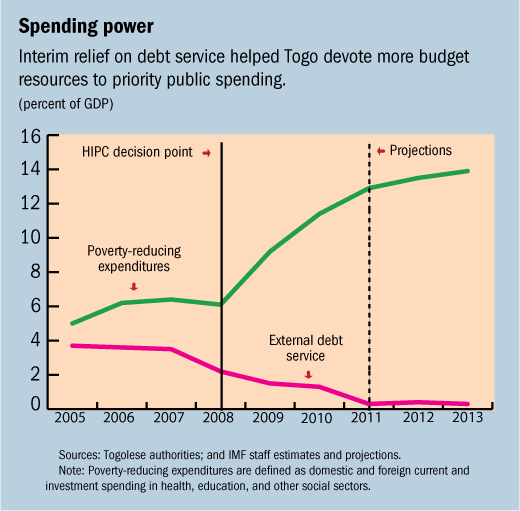
Typical street scene in Santa Ana, El Salvador. (Photo: iStock)
IMF Survey: IMF, World Bank Support $1.8 Billion Debt Relief for Togo
December 15, 2010
- Debt relief is equivalent to 82 percent reduction in nominal external debt
- Relief created sound public finances, freed up resources for priority spending
- Further reforms will need to promote faster growth, notably in private sector
The IMF and the World Bank decided December 10 and December 14, respectively, to support the final stage of debt relief for Togo that could amount to $1.8 billion in nominal terms.

Textile factory in Dadja, Togo, where authorities intend to improve business environment by revising investment code (photo: Yvan Travert/Newscom)
DEBT RELIEF FOR AFRICA
The relief is equivalent to an 82 percent reduction in the West African country’s nominal external debt.
The decision grants Togo debt relief under the Heavily Indebted Poor Countries (HIPC) Initiative. Having reached the HIPC final stage, or completion point, Togo also qualifies for debt relief under the Multilateral Debt Relief Initiative (MDRI) from multilateral financing institutions.
Togo’s graduation from the HIPC process brings to 31 the number of countries reaching the HIPC completion point—the stage at which debt relief becomes irrevocable and unconditional. Liberia and the Democratic Republic of the Congo reached their completion points earlier in 2010.
Togo’s debt relief started in November 2008, when the country reached its decision point in the HIPC process that translated into interim relief on debt service. The interim relief helped Togo devote more budget resources to priority public spending to reduce poverty and rebuild infrastructure (see chart). Such spending has doubled in nominal terms over the period 2008–2010.

“With this milestone, Togo has turned a page on the economic distress of its decade-long domestic crisis and can now face the future without the burden of an unsustainable external debt,” said IMF mission chief for Togo Marshall Mills. “Togo’s rapid progress in economic stabilization and structural reform not only qualified the country for debt relief but also laid the groundwork for future success.”
Commitment to reform
Mills noted that, thanks to its strong commitment to reform, Togo had advanced from interim debt relief to the completion point in two years. This was an exceptional achievement for a country that started with low administrative capacity, Mills said.
“With a much lighter external debt burden, the country is now free to continue devoting more of its scarce resources to priorities, “ Mills stated. “Just as importantly, Togo’s greatly improved financial health can provide a solid foundation for advancing the country’s development, especially the economic growth and private investment essential to meeting its goals.”
With the achievement of the HIPC completion point, Togo’s external debt has been irrevocably reduced from $2.2 billion at end-2007 to about $400 million at end-2010, equivalent to an 82 percent reduction in nominal debt. Debt relief under the MDRI accounts for close to $690 million of this reduction. As part of the debt relief process, all of Togo’s external arrears—which accounted for 80 percent of nominal external debt—have been written off, rescheduled, paid off, or are being paid off.
Strong reform effort
To support Togo’s economic reform program, the IMF Executive Board approved in April 2008 a three-year arrangement under the Extended Credit Facility (ECF), equivalent to about $101 million, later increased to a total of about $146 million.
Prerequisites for reaching the HIPC completion point included maintenance of economic stability, as evidenced by satisfactory implementation of the ECF-supported economic program, and other measures defined at Togo’s interim debt relief stage, notably implementation of a poverty reduction strategy and improvements in public financial management and social sector policies.
Togo has successfully pursued economic stabilization, supported by strong implementation of its ECF-supported economic program. It has maintained a prudent fiscal policy that, while allowing for needed stimulus to the economy in 2009–2010, remained consistent with debt sustainability. Togo has greatly increased public investment in human and physical capital, to address large gaps that are a legacy of the crisis.
Togo has also pursued structural reforms critical to macroeconomic stability. It has strengthened fiscal governance, enhancing the transparency of natural resource revenue, clearing the large stock of arrears to domestic suppliers, establishing audit bodies, and reforming treasury operations. At end-2008, the authorities recapitalized three of the four largest banks, which were insolvent, and preparations have advanced for privatizing state-owned banks, including new privatization legislation.
Benefits of debt reduction
Debt relief has created sound public finances and freed up resources for priority spending. Togo’s priorities now center on exploiting the opportunities provided by pursuing an economic policy aimed at sustained, faster economic growth, coupled with fiscal sustainability.
Maintaining newly found confidence requires a fiscal policy that avoids accumulating public debt at an unsustainable pace while creating budgetary space for priority spending. Among other things, Togo needs to follow through on plans to strengthen revenue mobilization and public investment capacity, especially prioritizing projects.
The Togolese authorities also intend to develop a sustainable medium-term debt strategy next year. Key elements of such strategy should be a sustainable fiscal balance, a high degree of concessionality in external borrowing, and sustained growth of about 4 percent annually, supported by structural reforms.
Reform measures will need to promote faster growth, particularly creating an environment favoring private sector growth. In addition to privatizing the largest state-owned banks, Togo also intends to improve the business environment by revising the investment code, the tax treatment in the free trade zone, and the customs code, as well as establishing a “one-stop window” for trade and tax procedures at the Port of Lomé, an important trade hub for the region.







